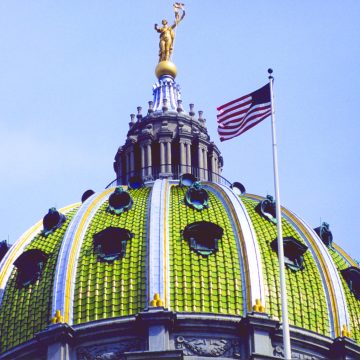
Satellite casinos have been added to the Pennsylvania online gambling bill in an effort to raise more revenues from gaming. Up to 10 brick-and-mortar satellite casinos could be placed in secondary sites around Pennsylvania.
Senate Appropriations Chairman Pat Browne (R-Lehigh County) confirmed that lawmakers included secondary sites in their Saturday negotiations. Existing licensed operators would have the right to bid on sites.
Satellite Casinos: More Jobs and Revenues
The purpose of the satellite casinos is to generate more revenue and create more jobs in the state. Operators would bid on licenses through several rounds of auctions. Slots-only facilities would cost $7.5 million for a license.
Gaming facilities with slot machine and table games would cost $10 million for a license. The slots rows in such facilities would range from 300 to 700 gaming machines. The new casinos would contain up to 40 gaming tables.
Favor the 12 Existing Casinos
The idea of “satellite casinos” is to build less extravagent, more cost-effective gaming venues in smaller communities. Satellite casinos are used as firewalls against out-of-state betting in many cases.
For the gaming operators, secondary facilities not only would foster more gambling opportunities for people who do not like to travel across state, but allow the casino company to promote their larger resort-style casinos to a new customer base.
No VGT Legislation
Coming on the heels of news that video gambling terminals (VGTs) would be eliminated from the appropriations bill, this has been a good weekend for the casinos and racinos in Pennsylvania. Not only do the casino operators not have to deal with 40,000 new rival gaming machines, but they get the right to open up a second facility to increase profits.
If the satellite casino clauses end up in the final omnibus gambling bill, it would be a major victory for major operators like Bethlehem Sands, SugarHouse, Penn National, and Stadium Live! Casino. The smaller venues might be little more than the much-derided “slots in a box” casino, but the larger establishments would be similar in size to the smaller resort-casinos operating in Fayette County and Valley Forge.
Pennsylvania Cities Slated for Satellite Casinos
Sen. Pat Browne did not mention the name of cities which might host satellite casinos, but Penn Live speculated that smaller cities like Williamsport, Altoona-Johnstown, Gettysburg, or Reading would be natural locations.
Browne said that the satellite casino plan was presented as an alternative to the VGT gaming, as an industry framework less likely to cannibalize revenues. The lawmakers’ ultimate design is to prop up the already-existing casino industry in the state, which showed signs of decline in 2016-2017. Slots revenues dropped 2.2% in Pennsylvania last year, while 9 of the 12 existing casino operations reported a drop in slots revenues.
25-Mile Buffer Zone around Existing Gaming Venues
The idea likely will be controversial. Lawmakers added language to create a 25-mile buffer zone around existing gambling locations, to preserve customer loyalty. Already, some operators in the smaller market have criticized the 25-mile stipulation, saying their areas do not have the population density to make a 25-mile radius viable.
Penn National Gaming suggested that the bill, as currently written, might create winners and losers even among the existing casino and racino industry.
Eric Schippers, the SVP of Public Affairs at Penn National (owner of Hollywood Casino in Grantville), said in a statement, “Given the size of the expansion under consideration and the fact that more than 50 percent of our customers come from beyond a 25-mile radius, this could have a devastating impact on our business.”
Tom Wolf Awaits Appropriations Bill on Monday
The language in the bill regarding satellite casinos might change by Monday, which is a soft deadline to have an appropriations bill on Gov. Tom Wolf’s desk. Governor Wolf has not said yet what his reaction would be if no bill is on his desk by Monday, but the fiscal year began on July 1. Lawmakers shuttled between the leadership suites at the capitol building and Gov. Wolf’s offices during the negotiations on Saturday.
Discussions on gambling legislation slowed negotiations. Gov. Wolf wanted $700 million in recurring revenues and that has taken significant creativity. Satellite casinos help close the reputed $2.2 billion budget gap significantly, in what is an overall $32 billion budget for the next two years.















